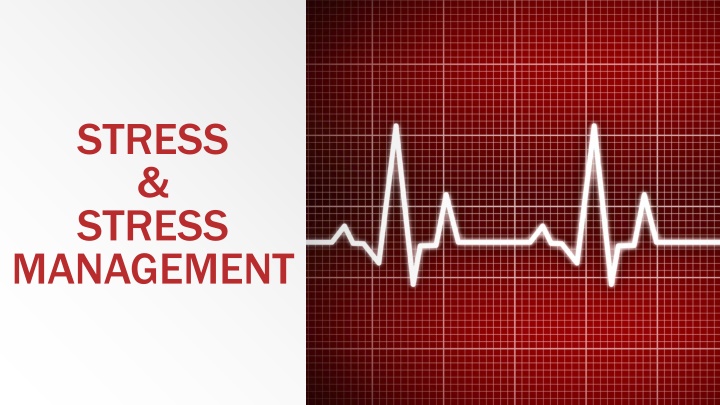
Managing Stress Effectively
Discover what stress is, its types, common stressors, signs of stress, and effective stress management techniques to help you live a healthier and happier life. Learn how to acknowledge stress, maintain good habits, build positive relationships, and implement strategies to reduce stress levels.
Download Presentation

Please find below an Image/Link to download the presentation.
The content on the website is provided AS IS for your information and personal use only. It may not be sold, licensed, or shared on other websites without obtaining consent from the author. If you encounter any issues during the download, it is possible that the publisher has removed the file from their server.
You are allowed to download the files provided on this website for personal or commercial use, subject to the condition that they are used lawfully. All files are the property of their respective owners.
The content on the website is provided AS IS for your information and personal use only. It may not be sold, licensed, or shared on other websites without obtaining consent from the author.
E N D
Presentation Transcript
STRESS & STRESS MANAGEMENT
WHAT IS STRESS? The body s reaction to pressure either mentally mentally or physically Two Types of Stress: Two Types of Stress: Eustress (Good Stress) Eustress (Good Stress) Weddings, special date, birth of a baby, etc. Distress (Bad Stress) Distress (Bad Stress) Examples: Death in the family, divorce, injury, etc. pressure, physically.
STRESSORS Things or events that cause Stressors are found everywhere cannot always get rid of or avoid them. But, the way we deal deal with them will make them either positive or negative. Common Stressors: Common Stressors: School, family, friends, work and others. cause us stress. everywhere and we
SIGNS OF STRESS Physical: tiredness, injury, insomnia, headache, tense muscles, etc. Emotional: worrying, irritability, crying, feeling anxious, nightmares, depression, etc. Behavioral: acting-out, inability to eat, extreme anger, hitting/punching, nail biting, nervous twitch, etc.
MANAGING STRESS Acknowledge It Good Diet Regular Sleep Regular Sleep Exercise Exercise Building Good Relationships Get Organized
MANAGING STRESS Make a To-Do List Don t Procrastinate Don t Procrastinate Mentally Count Down Take a Break Laugh Say NO to Things Listen to Music Listen to Music
